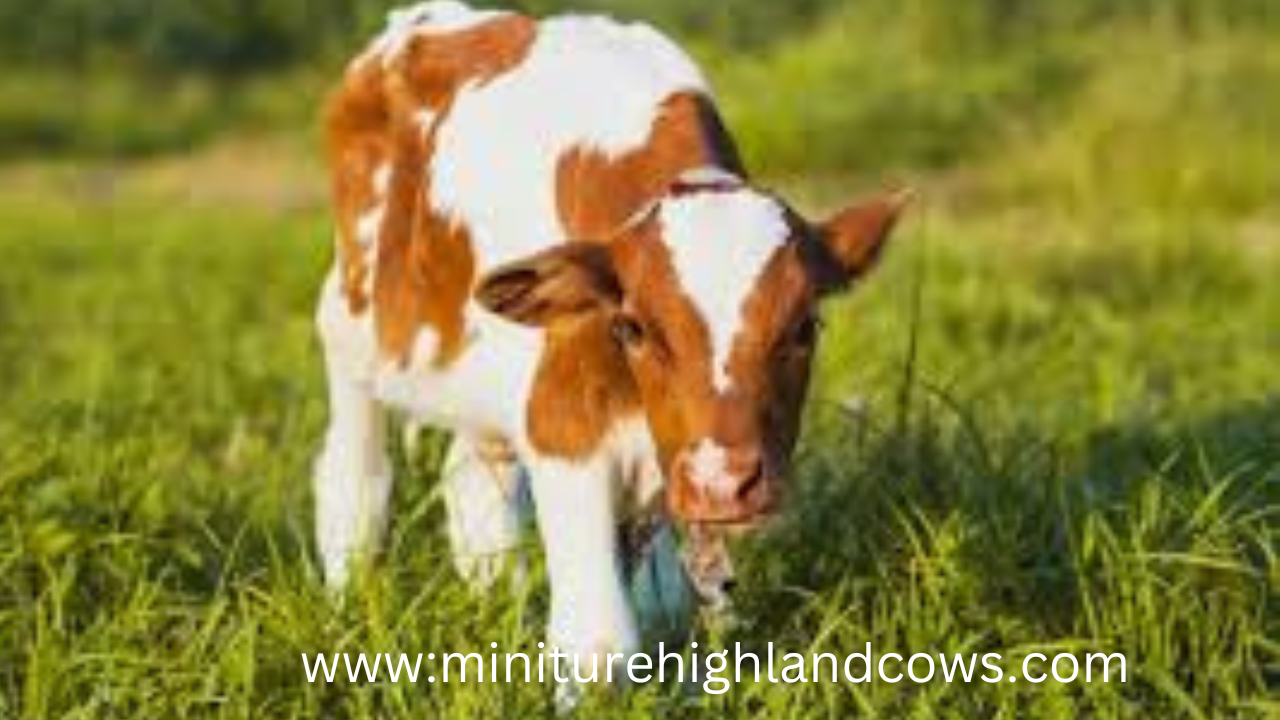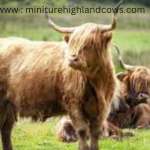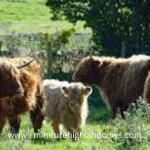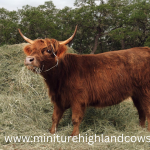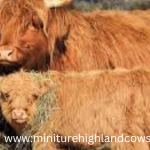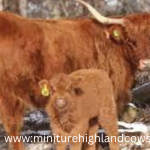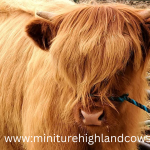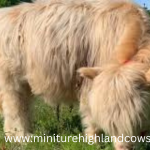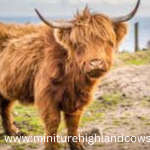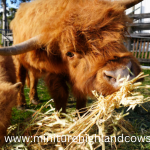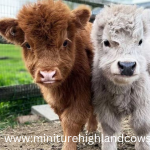Miniature Highland cows have a surprisingly long life span in cattle, having been recorded in the following ranges:
Average Lifetime of Miniature Highland Cow
15 to 20 years are very common, but some may even reach over the boundaries with proper care.
Reason for the Longevity
- Hardiness: Miniature Highland cows just like the full-sized ones are very resistant to harsh, cold climatic conditions owing to their rather thick coats and ruggedly built bodies.
- Proper Care: Veterinary care, good diet, clean water, and adequate shelter ensure a long healthy life
- Genetics: Miniature Highland cattle are pretty healthy animals, so those coming from good genetic lines can live longer than others.
Good care under the proper living conditions and good handling ensure that miniature Highland cattle can provide years of companionship and value on small farms and homesteads; often well into their twenties.
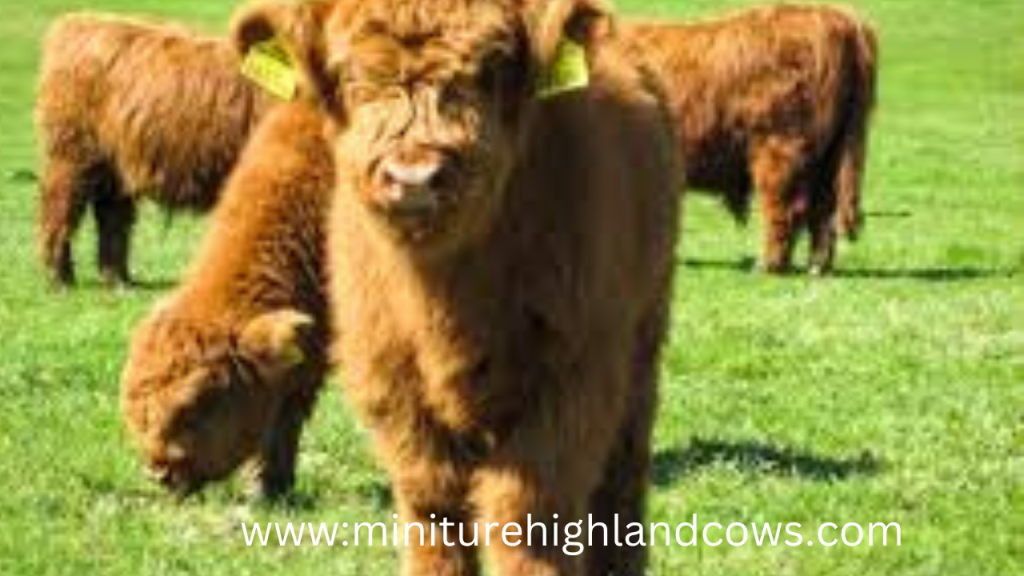
How big do miniature Highland cows get
A miniature Highland cow is much smaller in comparison with the standard-sized Highland cows. They are perfect cattle for small farms or else as companions. Here is a general outline of their average size.
Average Size of Miniature Highland Cows
- Height: The miniature Highland cattle range between about 36 to 42 inches at the shoulder.
- Weight: About 500 to 700 pounds, depending upon whether one uses the heaviest or lightest in a particular breeding.
- The standard Highland cow is always 48 inches or taller and weighs in between 1,100 to 1,800 pounds. By comparison, the minis are actually way smaller, which makes them a bit easier to manage.
Space and Care Requirements
Due to their smaller size, miniature Highland cows require significantly less grazing space than more well-known Highland breed. They can thus be rather easier to control for small-scale farms since their compact body retains all the desirable characteristics of the Highland breed: long hair, docile temperaments, and characteristic horns but in a smaller, more useful size for hobby farmers and enthusiasts.
Mini Highland cow milk production
Although they can be milked, their yield is nowhere near that of the standard dairy breeds. If you’re considering a miniature Highland cow just for the milk, here’s what you can expect:
Milk Production of Miniature Highland Cows
-Average Yield: Miniature Highland Cattle produce 1 to 2 gallons of milk daily. This is going to depend on diet, genetics, and the overall health of the miniature Highland cows. Compare this with a huge dairy breed that may produce 6 to 8 gallons in a day or more
Milk Quality
- High Butterfat Content: Highland cows, including miniatures, produce very rich milk with high butterfat content, usually at 4 to 5% butterfat. This makes their milk creamy and superb for butter and cheese production and other dairy products.
.
For Small Farms
Although miniature Highland cows are not particularly suitable for large-scale milk production, they may be suitable to small farmers or homesteaders seeking a small milk supply for household purposes. Their hardiness combined with a manageable size make them a sensible option for someone who would prefer easy management and quality milk production over quantity.
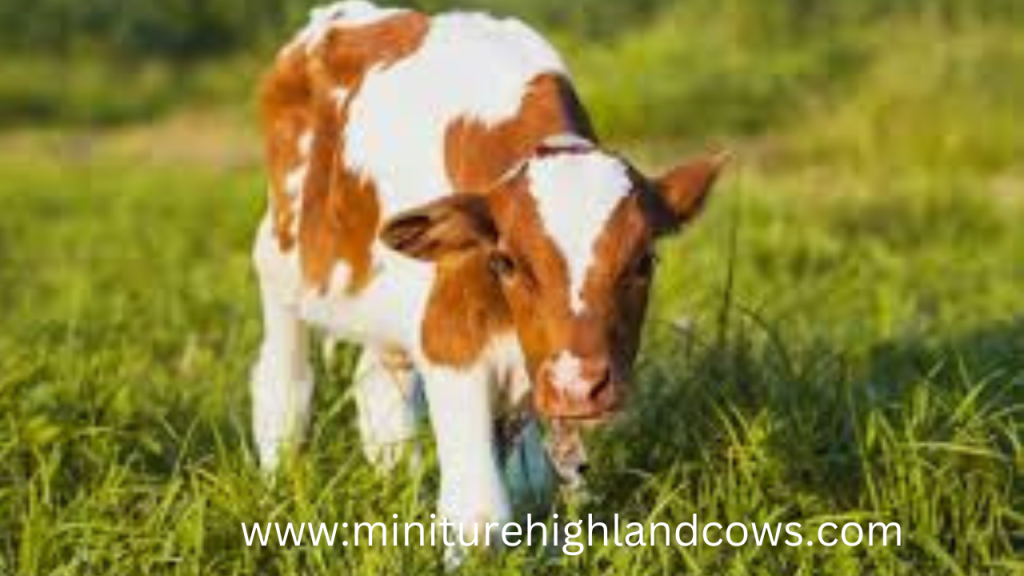
best mini cow for milk
If you’re looking for a miniature cow specifically for milk production, some breeds stand out for both yield and quality. Here are some of the best mini cow breeds for milk:
1. Miniature Jersey
- Milk Production: Mini Jerseys are the most popular miniature dairy breed, producing around 1.5 to 3 gallons of milk per day.
- Butterfat Content: High, typically 5% to 6%, resulting in creamy, rich milk that’s ideal for making butter and cheese.
- Temperament: Known for being friendly and easy to handle, making them ideal for small farms and homesteads.
2. Miniature Holstein
- Milk Production: Mini Holsteins can produce 2 to 4 gallons per day, though their yield is typically a bit lower than full-sized Holsteins.
- Butterfat Content: Lower than Jerseys, usually around 3% to 4%, which is still suitable for a variety of dairy products.
- Temperament: Generally gentle and social, though they can be more active than other mini dairy breeds.
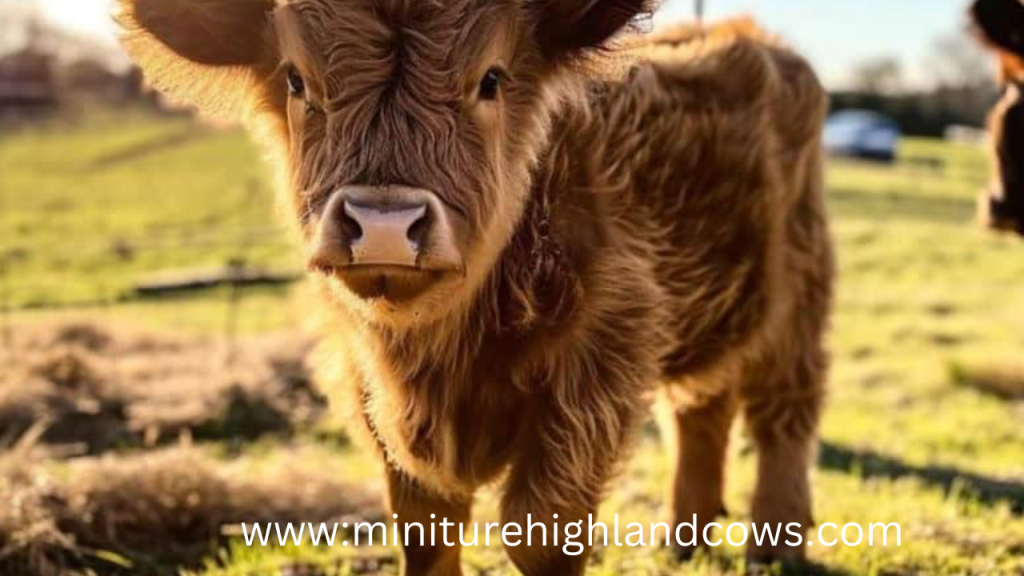
3. Miniature Guernsey
- Milk Production: Mini Guernseys produce around 1 to 2 gallons per day.
- Butterfat Content: High, often 4.5% to 5%, giving the milk a golden color and rich taste.
- Temperament: Guernseys are typically docile, making them a good choice for families with young children.
4. Miniature Dexter
- Milk Production: Around 1 to 2 gallons per day, so they are less productive than a mini Jersey but still a good choice for a small family.
- Butterfat Content: Moderate, typically 4%, with a rich and creamy consistency.
- Dual Purpose: Dexters are also raised for meat, making them a good dual-purpose breed for small farms.
Summary: Best Choice for Milk
If milk production is your main priority, Miniature Jersey cows are generally the best choice due to their high yield and excellent butterfat content. They produce a reliable amount of milk for personal or small-scale use and have a gentle temperament, making them easy to work with on smaller farms.
Here are some FAQs about the lifespan of miniature Highland cows:
FAQs: How Long Do Miniature Highland Cows Live?
1. How long do miniature Highland cows live?
- Miniature Highland cows will live between 15 to 20 years, as full-sized Highland cattle. With good care, some may live even longer.
2. Are miniature Highland cows longer-lived than regular cattle?
- Standard and miniature Highland cows are quite hardy and hard-wearing. They tend to live longer compared with most other breeds of cattle since they are known to have a more robust state of health and wider capability to thrive in almost any climate.
3. Identify Factors That Affect the Lifespan of a Miniature Highland Cow?
- Diet and Nutrition: One of the most critical factors is making sure they get enough nutrition and a proper diet.
- Health Care: Regular veterinary checks, vaccinations, and deworming decrease the disease incidence.
- Environment: Highland cattle are bred to survive harsher conditions; there is direct correlation between shelter in extreme conditions and longevity.
- Genetics: Strong, healthy breeding lines relate to a longer life.
4. How do I support my miniature Highland cow to live a long, healthy life?
- They should receive a healthy diet, fresh clean water, and regular veterinary checkup. Good provision of safe and clean environment should be offered, sheltered for cold and hot conditions if possible.
5. **Are miniature Highland cows prone to any specific health issues?
They are, generally speaking, a quite hardy breed with few breed-specific health issues; however, as with any cattle species, they may face issues with pests and parasites, digestive upset, or hoof problems. Regular veterinary check-ups and care can prevent such.
6. Do miniature Highland cows have special needs as they mature?
- It is very true that older cows would be more sensitive to softer feed, dental check-ups, and probably some supplement for joint health. Proper observation on any mobility issues or the signs of aging would allow them to be taken care of as they grow older.
7. How Does the Climate Impact the Life Expectancy of Miniature Highland Cows?
- Highland cows, including the minis, thrive well with cooler climates due to their heavy, insulating coat. In warmer climates, they will need shade, fresh water in abundance, and occasional grooming to keep them comfortable.
Miniature Highland cows are robust, long-lived animals well adapted to a range of environments, and, if cared for properly, can be excellent companions and productive animals for many years.
